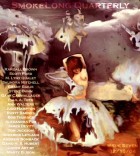You’re working on an anthology titled Orphan Piss. How is that coming?
Orphan Piss is a collection of short stories I’m writing about kids raised in the foster care system and the people who take care of them. One, “Here Go Yusef,” was published in Fugue Magazine. I’m in the process of rewriting some of the other stories and sending them out. Every story humbles me, kicks my ass, but I think I’m gaining on them.
How long have you been working in the Foster Care program? How did you get into the field?
I’ve been working for San Mateo County (Ca.) Children’s Services for almost twenty years. I started out working as a counselor in the county shelter for abused and neglected kids. Right now I work as an in-home counselor in a Therapeutic Foster Care unit. Prior to coming west, I’d lived in Mexico for a year and a half, and prior to that I’d worked as counselor in juvenile hall outside of Philly, and I wasn’t really crazy about working a job where I’d be locked up eight hours a day again. I was also going to grad school and was broke, took the first job I could get—it just happened to be at a treatment center for emotionally disturbed kids. The title story in Orphan Piss is set there.
What first motivated you to write?
To keep from working. I hate to work. When the military gave veterans an additional year to attend college on the GI Bill, I quit my job at juvenile hall and headed to Mexico to study creative writing though I’d never written anything. It beat working for not enough money and freezing my ass off. School lasted a quarter because the school lost its accreditation. When I’d told an ex-professor that I wanted to write, he’d said, good, if I had something to say. I didn’t really know what he meant because I’d never really read anything as a reader and so I had no idea what it was I wanted to say, but I’ve found out he was right and that I have something to say.
How do you feel about flash fiction versus other literary forms?
I love flash fiction because it’s short and it gives me, like a jazz musician, a chance to get off, to get out of my tree. It’s short enough so that when I rewrite, I can wrestle with the language without burning myself out. If I only have 20 minutes to work on a piece of flash, I can actually feel I’ve gained on it. On longer pieces it takes me twenty minutes to try to remember who my characters are and what they’re supposed to be doing.
Finally, talk to us a little bit about the integration of sports into literary fiction, something we don’t see very often.
First off, I love sports. So it seems only natural to write about them. Plus I know a little bit about them since I’ve spent so much time trying to play them, watching them on TV, listening on the radio, reading, talking about them. What’s our obsession with, our relationship to all these games? I’m intrigued by that. I’m trying to write about sports in new ways, imagine new characters, make people look at sports, others, and themselves, in new ways. I don’t know of many writers who do it. Good, that’s less competition for me. Fred Exley’s A Fan’s Notes is right on it. Don DeLillo’s End Zone too. Plus they make you laugh. That’s some important stuff. You got to laugh, man.



 The core workshop of SmokeLong Fitness is all in writing, so you can take part from anywhere at anytime. We are excited about creating a supportive, consistent and structured environment for flash writers to work on their craft in a community. We are thrilled and proud to say that our workshop participants have won, placed, or been listed in every major flash competition. Community works.
The core workshop of SmokeLong Fitness is all in writing, so you can take part from anywhere at anytime. We are excited about creating a supportive, consistent and structured environment for flash writers to work on their craft in a community. We are thrilled and proud to say that our workshop participants have won, placed, or been listed in every major flash competition. Community works.